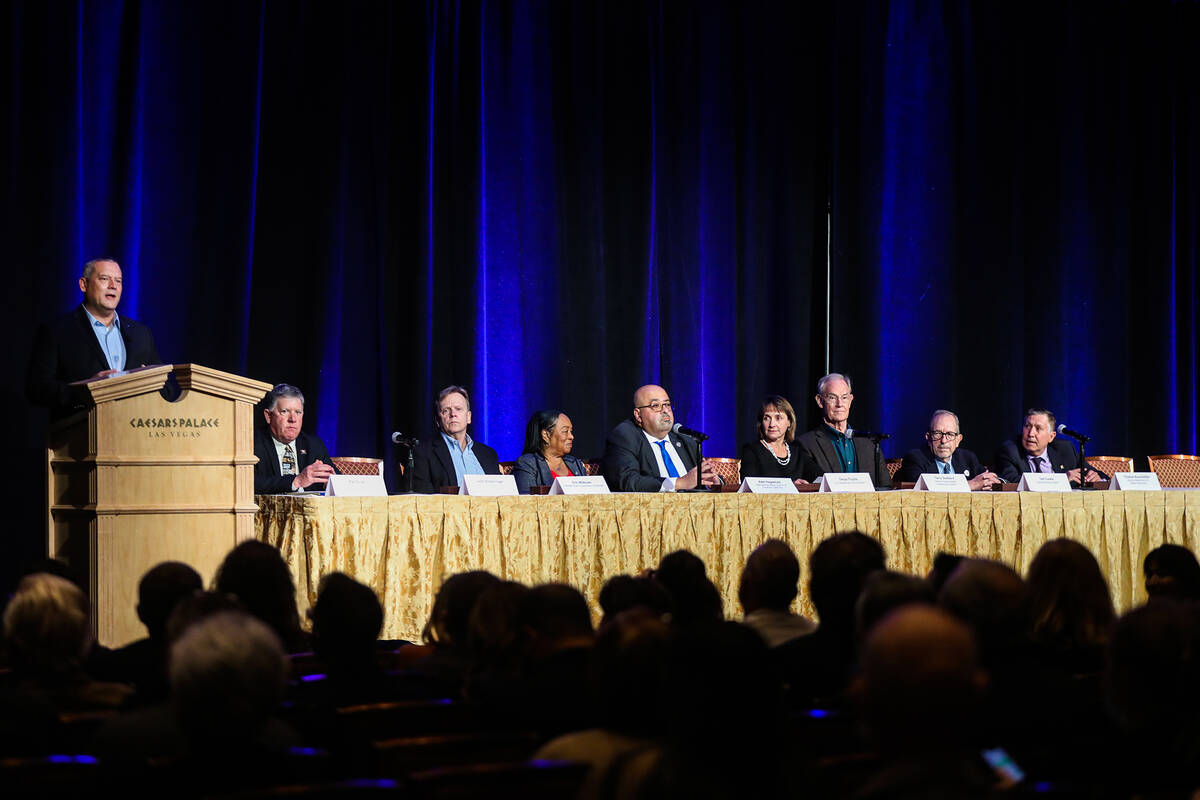Colorado River officials will descend on Las Vegas this week. Here’s what to know

With the dawn of a second Trump administration and a looming deadline for interstate negotiations, Las Vegas will turn its focus to the Colorado River this week.
Scientists, nonprofit advocates, tribal leaders and negotiators from all seven states that rely on the river will attend the Colorado River Water Users Association conference at Paris Las Vegas beginning on Wednesday. Historically, it has been an annual forum to discuss the most pressing issues affecting water availability across the basin.
On Nov. 20, with little notice, the Bureau of Reclamation released a list of five paths forward for critical deliberations about how to manage the river past 2026, when current guidelines expire. The brief descriptions of each offered few details.
“Leading into CRUWA next week, we finally have the alternatives,” said John Berggren, regional policy manager for nonprofit Western Resource Advocates. “We know what the Bureau of Reclamation is going to study next year, and we’re starting to get some ideas of what the new guidelines might actually look like.”
Many unknowns, not many anticipated solutions
The conference comes at a time when President-elect Donald Trump has yet to name a commissioner to the Bureau of Reclamation. The commissioner will play an integral role in managing water in the West.
But most important to Nevadans this year is how talks may proceed on how to operate the river.
The Upper Basin — consisting of Utah, Colorado, New Mexico and Wyoming — has remained bitterly divided from the Lower Basin — California, Arizona and Nevada — on how to best update operating guidelines for the river before they expire.
Disagreements between the two coalitions of states largely center around whether the Upper Basin states should be required to take cuts to their allocations in times of extreme drought. Lower Basin states have requested that the Upper Basin’s smaller reservoirs also be taken into account when deciding if low water storage warrants further reductions by states.
In an October interview, John Entsminger, Nevada negotiator and general manager of the Southern Nevada Water Authority, told the Las Vegas Review-Journal that he didn’t anticipate any major announcements to be made at the conference.
“I certainly don’t think you’re going to see a final product,” Entsminger said.
What we know so far
In its recent announcement, the Bureau of Reclamation notably released a so-called “Basin Hybrid” alternative. While the bulleted list the agency created didn’t seem to offer much detail, it does signal that there may need to be more productive discussions that are down the middle.
Talks between the states and the federal agency happen behind closed doors, allowing for little public knowledge of the negotiation process, except for outreach requirements of the National Environmental Policy Act process needed to push plans forward. The conference is a rare chance to hear from all decision-makers at once.
Native American tribes, which have historically been denied access to their water rights, joined nongovernmental organizations and nonprofits in airing their ideas to the Bureau of Reclamation, and many of those ideas are reflected in listed alternatives.
Berggren and his colleagues wrote the “Cooperative Conservation” alternative that calls for Lake Powell releases to be based on the contents of Upper Basin reservoirs.
The Basin Hybrid alternative is an indicator of some progress, Berggren said, but he’s still interested in hearing what negotiators have to say at the conference.
“Basically, what we saw was Reclamation say, ‘Here’s an idea of taking the Upper Basin proposal, Lower Basin proposal and making them into a hybrid. Let’s start the conversation there,’ ” he said.
Contact Alan Halaly at ahalaly@reviewjournal.com. Follow @AlanHalaly on X.